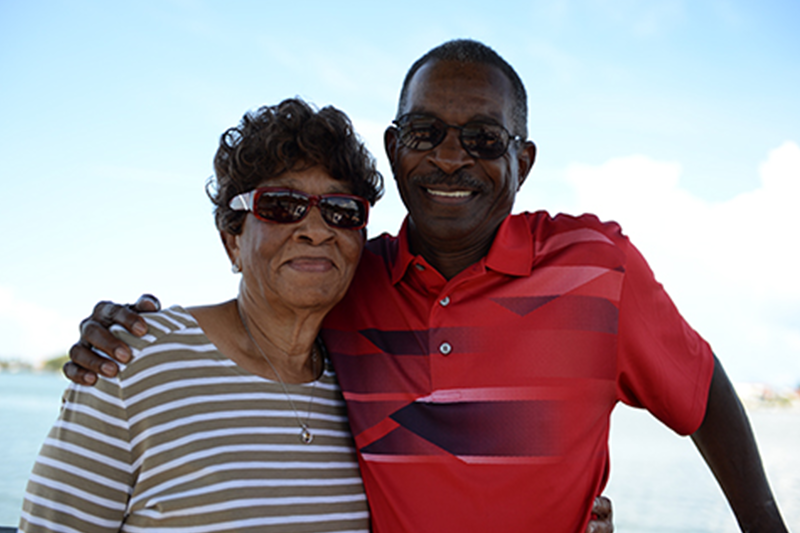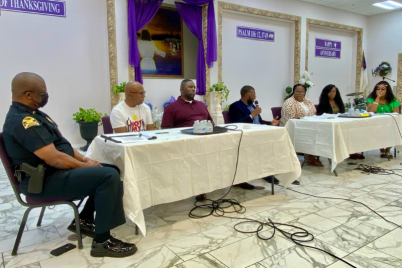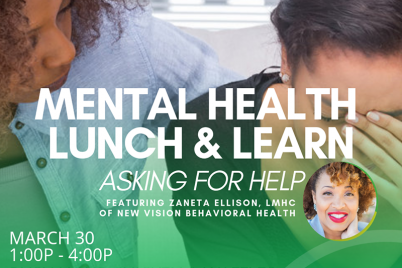L-R, Josephine Smith with Veteran Pierre Williams
BY MELANIE L. THOMAS, MBA, Public Affairs Specialist
PETERSBURG — He came home from Vietnam with nightmares, intrusive thoughts and flashbacks, but with the help of Cognitive Behavior Therapy and Prolonged Exposure Therapy at the Bay Pines VA Healthcare System, Pierre Williams is learning to get past the pain.
He was a young Marine with gunfire all around. Any bullet might be the one that killed him. His job was underground, in the dark, as a tunnel rat, to ferret out any North Vietnamese soldiers. Most didn’t survive the job. There were poisonous snakes and danger around every corner.
“About one in every five (tunnel rats) survived,” he said. “It was a suicide mission.”
He came home to dreams of corpses, burning flesh and post-traumatic stress. With the help of Cognitive Behavior Therapy and Prolonged Exposure Therapy at the Bay Pines VA Healthcare System, Pierre Williams is learning to get past the pain.
Williams suffered from nightmares, disturbing thoughts and flashbacks for years before reaching out for help in 2009 and learning he had post-traumatic stress.
“The staff here at Bay Pines was very patient with me. They allowed me to express myself, were supportive when I needed them and allowed me to talk about things that held me [captive] in my own way,” Williams said.
The therapy meant revisiting his past and all the dangers in Vietnam.
“I remember being in a tunnel and seeing matted baskets,” he said. “If you did not know how to navigate around them, or gave them the slightest bump, you could be bitten by the most poisonous kind of snake.
“One bite and you were dead.”
It took several more years before Williams tried additional therapy.
Dr. Kellie Hyde, clinical psychologist for the Post Traumatic Stress Disorder Integrated Recovery Program worked to gain his trust, make him feel safe, and assist him with taking the next step in his recovery.
“Prolonged Exposure Therapy can be very difficult for Veterans because it may feel very scary for them,” Hyde said. “When they do make the decision to have this type of therapy, their symptoms may worsen before getting better.”
Hyde helps Veterans understand why the therapy is important, how it is going to help them meet their treatment goals and, if they do the work, move past their trauma.
“I was afraid to commit … because I knew it would bring out the most severe trauma events I endured in Vietnam,” Williams said. “However, one of the most significant steps in my recovery was when Doctor Hyde helped me to overcome one of the reoccurring nightmares I had.
“I would see the charcoaled bodies of a mother and her child I had killed. The thing that stayed with me for years was reliving that moment when I see their eyes staring back at me.”
Dr. Sarah Barron, program manager for the Post Traumatic Stress Disorder Integrated Recovery Program, said this type of therapy is well researched and helps reduce symptoms so Veterans can have a more functional life.
“Clinical experience tells us these are the most effective approaches in treating patients with PTSD,” Barron said.
Prolonged Exposure Therapy was not easy for Williams, but he said he is grateful to give it a chance.
“The turning point for me was when I realized the sincerity and compassion of the Mental Health team. They saw that I really wanted to do well in this program and gave me the tools to succeed,” Williams said.
Making treatment a collaborative process is necessary so Veterans reach their recovery goals.
“The decision to engage in trauma-focused work can be a difficult one for many patients,” Hyde said. “Establishing trust and a relationship with them is imperative in helping to coach them along the process. I’m not the one driving the bus. They’re in charge.”
And now that Williams completed the program, he encourages others to give it a chance.
“This program has taught me to cope with my issues,” he said. “I would encourage others to come to VA and face their fears. You can’t face them by yourself. It takes a hero to ask for help, and I am grateful that I did.”
To learn more about Post Traumatic Stress Disorder programs at the Bay Pines VA Healthcare System, please visit https://www.baypines.va.gov/services/Stress.asp. For more information about National PTSD services available to Veterans, visit www.ptsd.va.gov








